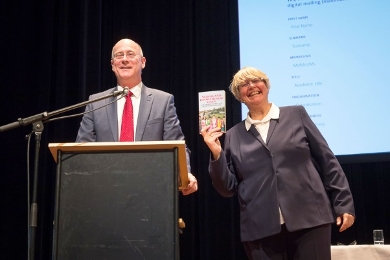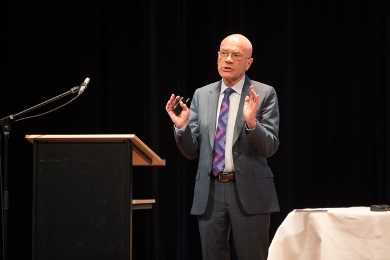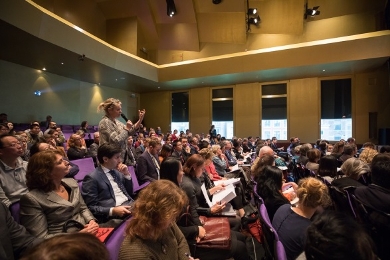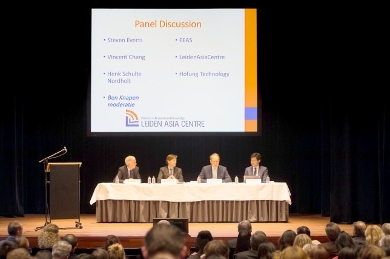
Report of the Conference: “China, the Netherlands and Europe”, 9th of February
How do Chinese view the Netherlands, and what do they experience here? These and other matters were discussed February 9th at the conference: “China, the Netherlands and Europe” which took place in Leiden. The conference, organized by the LeidenAsiaCentre, also marked the opening of the Leiden Asia Year; the year in which the municipality, the museums and University of Leiden dedicate the majority of their programs to Asia.
The focus during the gathering was on four research reports of the LeidenAsiaCentre: Chinese companies in the Netherlands, Chinese students in the Netherlands, the Netherlands in Chinese (social) media and the perception of Dutch-Chinese diplomatic relations among Chinese, Dutch and European diplomats. The researchers ,who are affiliated with the LeidenAsiaCentre, had at an early stage presented their findings to the societal partners and the results had been reviewed with this group already in November. The afternoon session of the conference was meant to discuss these reports with a bigger group of participants.
The conference was opened with an introduction of the LeidenAsiaCentre and the Leiden Asia Year by academic director Kasia Cwiertka. Using the website of the Leiden Asia Year, she illuminated the diversity of the 150 projects which will take place in this year. Additionally, she spoke about the several projects and activities undertaken by the LeidenAsiaCentre since its founding in January 2016 and gave a preview of future projects, like the continuation of the “Slaves of the System” project that had revealed the slave labor of North-Koreans in the European Union.

Subsequently , Frank Pieke and Garrie van Pinxteren presented their book: “The Netherlands through Chinese Eyes “ (in Dutch) in which the afore mentioned academic reports are digested into an analysis of the impressions and opinions Chinese students, companies and journalists had during their stay in the Netherlands.

That it is crucial to learn to understand China became clear in the presentation of British author and key-note speaker Martin Jacques. With the title: “A frozen Europe and a fast-changing China” he discussed the rise and changing international position of China, and how this concerns the country’s relation with Europe. He pointed at the fact that it is very important that Europe refrains from looking at China from a solely western viewpoint, because China can only be understood through its own history and culture. Only then does Europe have a chance to remain relevant in the global economy of which the center of gravity is shifting ever more to the east.

The afternoon session started with break-out sessions which closely examined the reports. The discussion with participants was meant to find out which additions can be made to the recommendations of the researchers.
The break-out session on Chinese companies in the Netherlands was presented by one of the researches: Tianmu Hong, and commented on by a panel consisting of Alex Niatsetsk (Asian Investment and Infrastructure Bank/Dutch Ministry of Finance) and Frans-Paul van der Putten (Clingendael). They further discussed the (geo)political implications of the increasing economic ties between China and the Netherlands. It became clear that many Chinese in the audience regarded this development as a positive thing, while in the Netherlands the possible political implications are often emphasized.
Frank Pieke opened the break-out session about Chinese students in the Netherlands, with Ingrid d’Hooghe (China Relations/ Clingendael) and Sabine Amft (EP-Nuffic) as panellists, and presented the results of the research on the growing number of Chinese students in the Netherlands. This was followed by an interactive session from which emerged that many educational institutions share the same experiences. It also turned out that the report is published at a critical moment, because the Dutch government is currently re-thinking aspects of the internationalization strategy in higher education.
Researchers Garrie van Pinxteren and Bei Wang introduced their findings in the break-out session on imaging of the Netherlands in the Chinese media. The discussion was opened by Tabitha Speelman (Trouw) and Ardi Brouwers (China Circle). The session revolved around the developments in the Chinese (social) media, for example how critical voices are slowly disappearing and the subtle influence that Chinese correspondents in Europe can practice in the Chinese media.

The conference was concluded by a plenary discussion with Steven Everts (EES). Henk Schulte Nordholt (Hofung Technology) and Vincent Chang (Fellow at the LeidenAsiaCentre); moderated by senator Ben Knapen (CDA). The panel members addressed from their respective fields their vision on the relations between China, the Netherlands and Europe, after which a discussion started between them and the participants. It appeared that both within the Dutch government as well as in the EU the importance to strengthen relations with China is recognized now China is rapidly taking up a leading role in the world. However, it is still unclear how this new reality can be conformed with current criticism on China concerning the lack of human rights, the rule of law and the restriction on the entry of foreign companies onto the Chinese market.
Frank Pieke, executive director of the LeidenAsiaCentre, remarked in his concluding speech that the method of the center, which focusses on the collaboration between society and the academic world, works really well and can lead to applicable and relevant results. Something which this conference has certainly proved.
